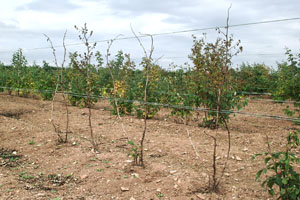Raspberries in the rain
Published on 29 June 2011 in Food, health and wellbeing

Research by The James Hutton Institute has led to the first molecular marker assisted breeding system for the raspberry, allowing the selection of those seedlings that can naturally resist Phytophthora root rot, the major raspberry fungal pathogen which impacts particularly badly in wet seasons.
Key Challenges
Development of high quality soft fruit cultivars with innate pest and disease resistance is essential to ‘future proof’ the UK industry in light of EU directive 91/414 EEC and consumer demand for chemical free fruit. Release of a new raspberry cultivar is a long, slow process taking up to 15 years. The application of molecular breeding for root rot should allow the time of a variety in development to be reduced by five years for field screening to five months lab screening.
Key Benefits
There is an un-met demand for UK grown soft fruit and great scope for increasing the number of consumers who purchase soft fruit in season - current estimates suggest 30% for raspberry - with a current value around £130m. Any increase in fruit consumption will be of benefit to growers, processors and the public. The fruit industry relies on a small number of varieties generally bred for fruit quality, and also on a decreasing number of chemicals for pest and disease control (91/414 EEC). This presents serious challenges for the future, as few suitable high quality varieties with innate resistance to major pests and diseases are available to growers and good fruit quality, rather than host plant resistance, continues to be the main focus for the commercial fruit breeding and processing companies. Availability of soft fruit is essential for health and increasing consumption is a goal for Scottish and UK Governments. Epidemiological studies have consistently shown a correlation between high dietary fruit and vegetable intake and a reduced incidence of some cancers and cardiovascular diseases.
The James Hutton Institute fruit genomics group has made globally significant advances and inputs to soft fruit breeding programmes in recent years. Outputs from the existing programmes are available to most of the main UK growers.
Breeding programmes at The James Hutton Institute are the only programmes with a significant upstream science base, particularly in contemporary genetics approaches, so that work can progress from basic lab-based work through field/glasshouse phenotyping to varietal selection and ultimately cultivar release and commercial production. The programmes have a wide genetic base encompassing breeding lines andspecies accessions that can be exploited using marker-based techniques to identify valuable new sources of key traits. The success rate of cultivar releases from The James Hutton Institute programmes within the Scottish and UK industries are unrivalled for over 30 years, and The James Hutton Institute fruit genomics group has made globally significant advances and inputs to the breeding programmes in recent years. Outputs from the existing programmes are available to most of the main UK growers, unlike most privately-sponsored selection programmes.


Comments or Questions
Related Websites
Our Partners
HortLINK, Technology Strategy Board and soft fruit industry.
Find Out More
For more information contact Julie Graham (Julie.Graham@hutton.ac.uk) or Nikki Jennings (Nikki.Jennings@hutton.ac.uk).Author
Julie Graham Julie.Graham@hutton.ac.uk







